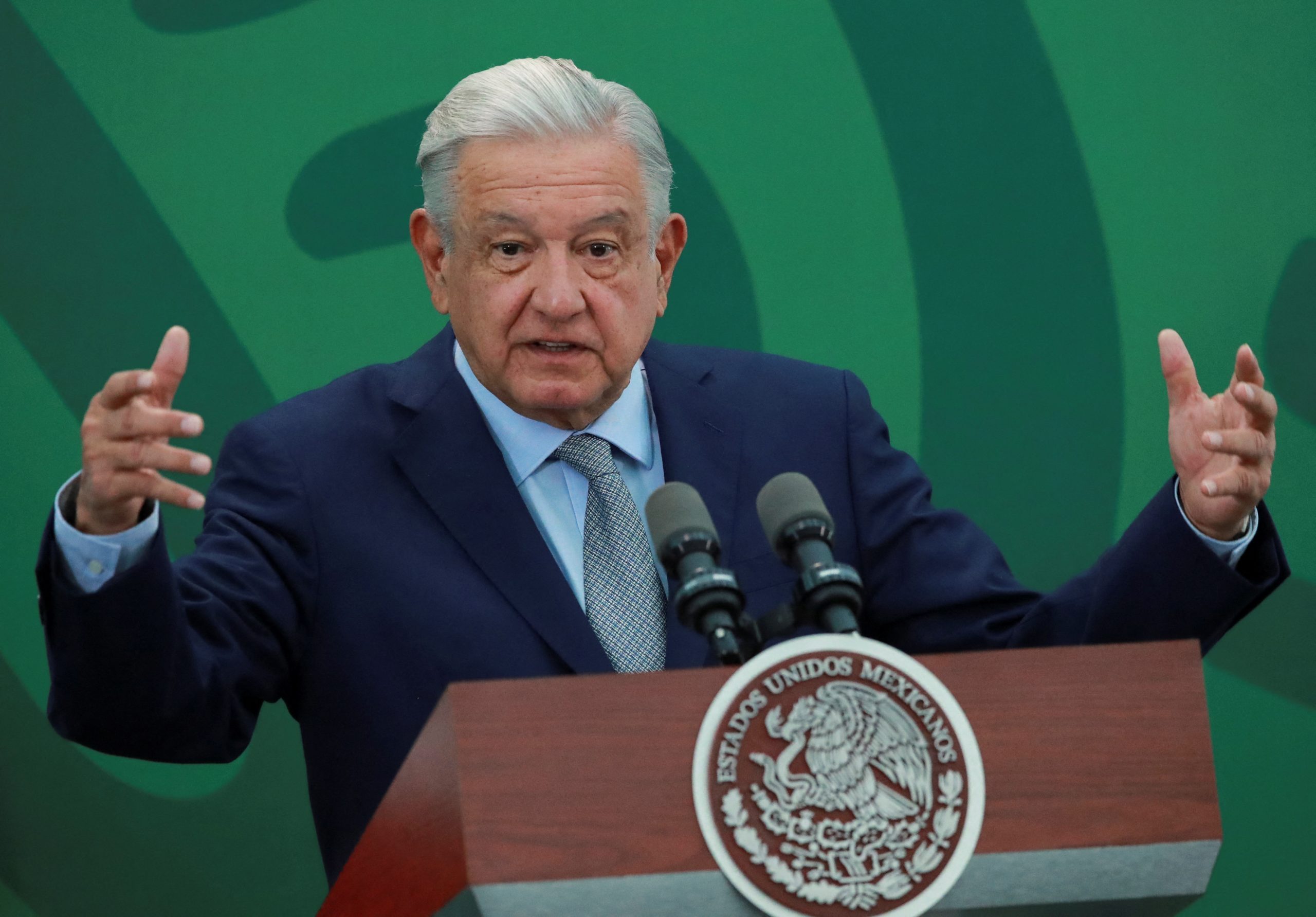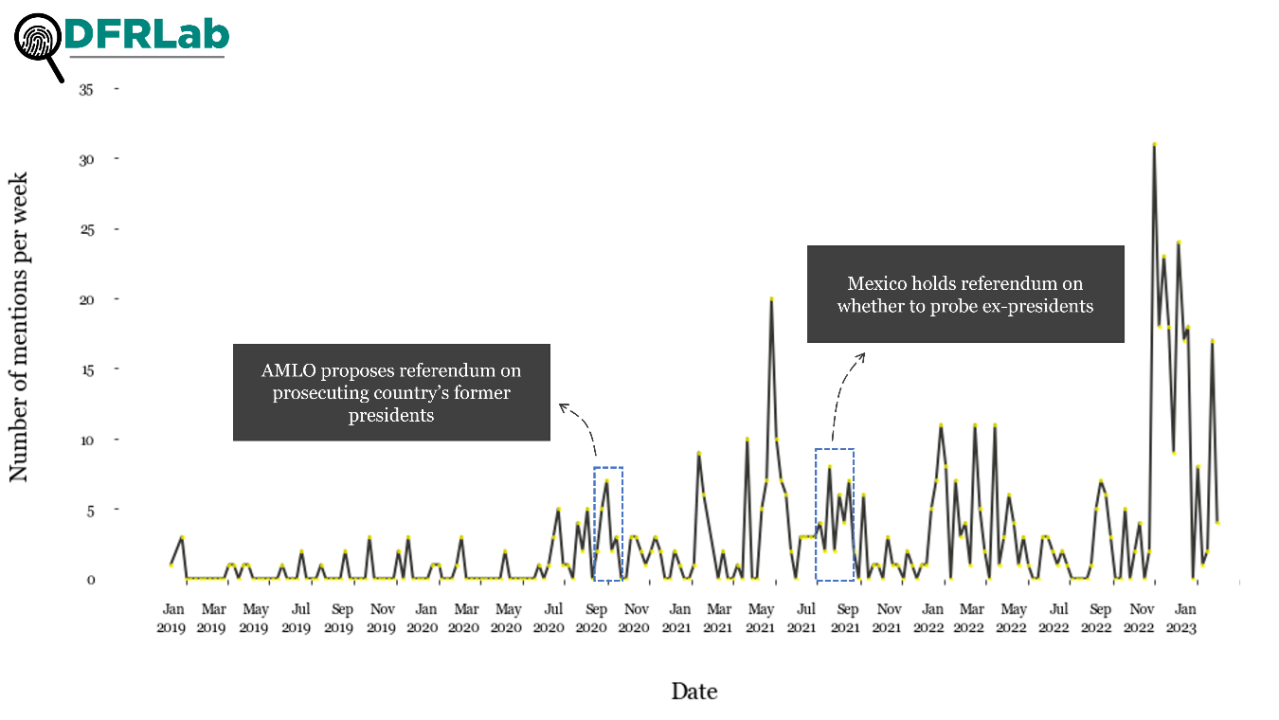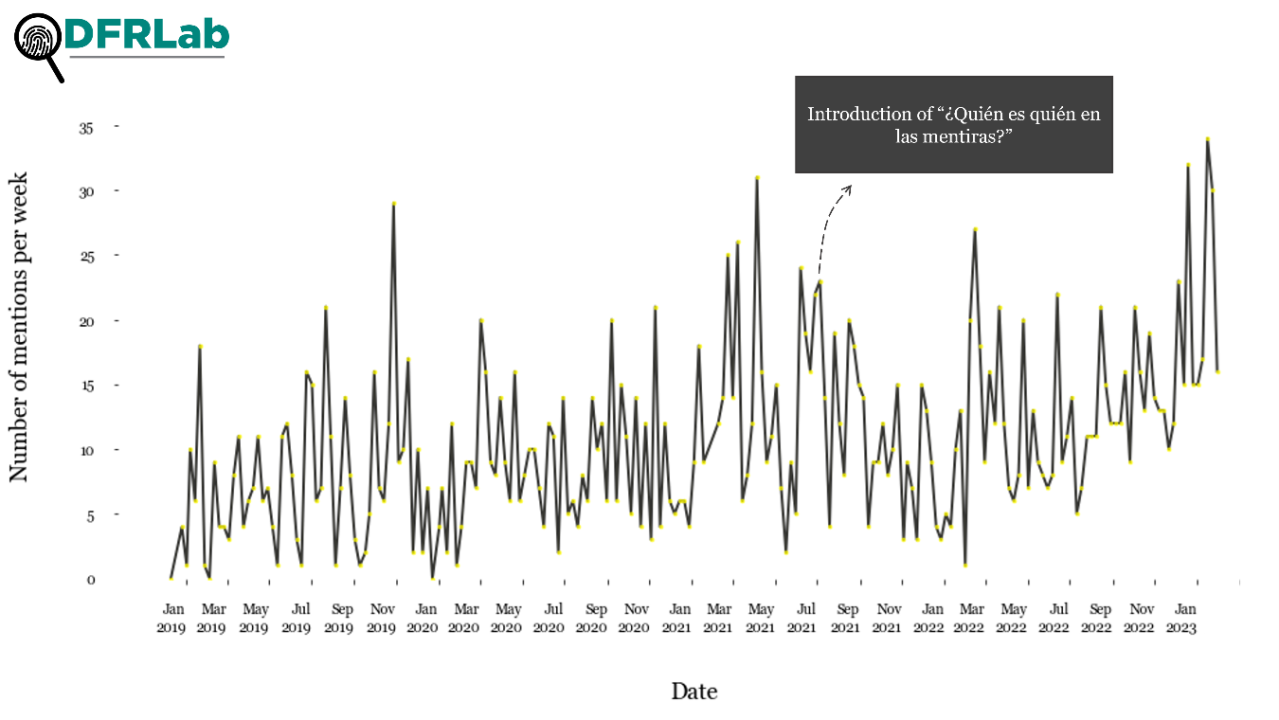Mexico’s president weaponizes narratives against media to combat criticism
AMLO’s morning press conferences foster a polarized environment encouraging mistrust in media and electoral institutions
Mexico’s president weaponizes narratives against media to combat criticism
Share this story

BANNER: Mexico’s President Andres Manuel Lopez Obrador speaks during a news conference in Mexico City on March 9, 2023. (Source: Reuters/Henry Romero)
Mexican President Andrés Manuel López Obrador’s daily press conferences have evolved into a platform for intensifying attacks on media outlets, opposition figures, and crucial democratic institutions like the National Electoral Institute (INE). A DFRLab analysis of the daily morning press conferences held by López Obrador, also known as AMLO, reveals that these attacks have become more frequent since mid-2021, after AMLO’s referendum on whether to investigate ex-presidents, and following the introduction of a new weekly segment called “¿Quién es quién en las mentiras?” (“Who’s who in lies?”).
AMLO remains one of the most popular presidents in Latin America. A January 2023 Gallup public opinion survey measuring the favorability of thirteen Latin American leaders found that AMLO is the fourth most favored leader, with a 69 percent favorability score. However, in his daily press conferences, AMLO often weaponizes narratives to discredit and undermine media outlets and the opposition. AMLO has accused media outlets of being part of a neoliberal and conservative elite and has labeled opposition parties as corrupt, immoral, and fraudulent. While these attacks have become a hallmark of his presidency, critics warn that such rhetoric could further erode the press, democratic norms, and institutions.
In February 2023, the Mexican Senate passed an electoral reform bill presented by AMLO. Known as “Plan B,” the bill introduced changes to the INE that would reduce the electoral agency’s budget, cut the number of workers, and see the permanent closure of local offices. As a result of the bill, the INE projects an 84.6 percent reduction in its services. The bill was passed one year before presidential elections are slated to take place in June 2024, limiting the autonomy and reliability of the next presidential election. The bill prompted more than 500,000 people to gather across Mexico to protest the new measures under the slogan, “The INE is untouchable.”
To analyze the narratives pushed by AMLO during the morning press conferences, the DFRLab collected transcripts from conferences held between December 2018 and February 2023. To explore these narratives, we identified the main topics, keywords, and patterns in speech, while focusing on narratives targeting media outlets, the opposition, and the INE.
Las Mañaneras
Since taking office in 2018, AMLO has held daily press conferences at 7:00 am, known as “Las Mañaneras” (derived from the Spanish word “mañana,” which means “morning), with the stated goal of promoting accountability and transparency. However, these conferences have become a platform for AMLO to verbally attack media outlets, opposition leaders, governors, mayors, and political parties that do not align with his government. However, the press conferences have failed to improve transparency as the AMLO government has the lowest rate of responses to transparency requests in two decades and there has been a 56 percent increase in appeals to transparency requests.
On June 30, 2021, as part of “Las Mañaneras,” AMLO introduced a new segment called, “¿Quién es quién en las mentiras?” (“Who’s who in lies?”). The segment aims to teach citizens how to detect fake news and “hunt down” columnists and media outlets that publish false or distorted information. This segment has been widely criticized for its potential to target press freedoms and promote narratives that could incite violence against journalists. The Special Rapporteur for Freedom of Expression of the Inter-American Commission on Human Rights expressed concerns about the segment, highlighting that it could be used to target journalists critical of the government and that it sends mixed messages about the government’s commitment to freedom of expression.
Since the introduction of “¿Quién es quién en las mentiras?” the segment has been featured approximately seventy times. An investigation published by Animal Político and the Latin American Center for Investigative Journalism found that in July 2022 alone, AMLO’s press conferences gathered eleven million views on social networks, according to information provided by the government. A query using the social media monitoring tool BuzzSumo found that press conferences featuring the “¿Quién es quién en las mentiras?” segment have amassed more than sixty million views on AMLO’s official YouTube channel and more than 2.5 million likes. The figure increases to seventy million views when including major outlets that stream the morning press conference, including UnoTV, Grupo REFORMA, MILENIO, and NMás.
Targeting Mexico’s National Electoral Institute
Mexico’s INE is an autonomous public organization responsible for organizing federal elections, overseeing political parties, and promoting citizen participation in the democratic process. Since 2018, AMLO has criticized the INE more than 500 times, accusing it of being an anti-democratic institution. Until January 2023, the most common narratives against the INE claimed the organization would “mislead information and votes,” in addition to allegations of ballot box stuffing, forgery of electoral reports, robbery of ballot boxes, and vote buying.
The president’s attacks against the INE increased in mid-2021 following a national referendum held in August 2021 to determine whether to investigate and potentially prosecute former Mexican presidents for their alleged involvement in corruption and human rights abuses. AMLO accused the INE of not conducting the referendum transparently and being biased against his government.

The narratives shared by the president targeting the INE have not been limited to accusations of bias and a lack of transparency. He has also targeted the organization’s budget and personnel. AMLO has repeatedly referred to the INE as a “rotten” institution and accused it of being a tool used by opposition groups to manipulate elections and media outlets. This criticism includes accusations of campaigns against him during his presidential runs in 2006, 2012, and 2018.
From July to December 2022, AMLO mentioned twelve times the need to reduce INE’s budget, claiming without evidence that it is the most expensive budget for an electoral institution in the world. AMLO justifies his argument by noting that the salary earned by the INE’s president and counselors is double the amount he earns as president, and is topped off with bonuses, trips, and transportation expenses. AMLO has also threatened to open a financial investigation against the INE. Additionally, the president proposed a renovation of the autonomous institution five times between July and December 2022, encouraging citizens to support a transformation of the INE to eradicate corruption.
Targeting the opposition
An analysis of President AMLO’s rhetoric since June 2021, when “¿Quién es quién en las mentiras?” was introduced, reveals that one of his key narratives involves framing Mexico’s opposition and other institutions as neo-liberal and conservative. This includes former presidents, political parties, foreign companies, media outlets, and journalists. According to data documented by the DFRLab, AMLO has referred to the opposition as “conservatist” 415 times; AMLO considers conservatism a new way to promote colonialism. He presents his opponents as highly privileged people that have manipulated citizens in the past, and claims he has the moral authority to protect Mexicans against corruption.
AMLO’s rhetoric against the opposition is often based on highly charged accusations questioning their morality and social values. Opposition representatives are accused of acting in bad faith. On September 8, 2021, AMLO said, “Well, the opposition…are known for their hypocrisy and their corruption, they are very corrupt.” He has also accused opposition of being unscrupulous politicians, with AMLO claiming they manipulated Mexican citizens to increase their individual benefits. On September 6, 2022, AMLO said, “Our adversaries are in a smear campaign since we started; they [the opposition] do not want the transformation of the country, they are very conservative, they want to maintain the status quo.”
With these narratives, AMLO attempts to paint the opposition as being against the Mexican people and against the equal distribution of economic resources. On November 29, 2021, AMLO declared, “These conservative groups [opposition] do not have faith in the people, they do not have love for the people, they do not respect the people, they are always elite, minority groups. Since they have no respect for the people, they think that the people are dumb, they despise the people.” AMLO has told citizens that he is the revolution and that the opposition is against the revolution because they are associated with corruption, tax write-offs, blackmailing, and holding special privileges for themselves while they promote poverty for most citizens. AMLO has also praised himself for disrupting the plan of conservative politicians who, AMLO claims, believe “who was born poor has to die poor.”
Targeting media outlets
Data collected by the DFRLab between December 2018 and January 2023 shows that AMLO made hundreds of references to media outlets during his morning press conferences, including 400 references in 2019 and 462 in 2020. The number of references then increased to 619 in 2021 and 675 in 2022. This increase coincides with the introduction of the “¿Quién es quién en las mentiras?” segment. Many of these references involve attacks on media outlets, portraying them as liars, manipulators of public opinion, serving a minority group with vested interests, and having been co-opted by large financial corporations.
AMLO frequently presents narratives about media outlets as being co-opted by wealthy individuals who control newspapers, radio stations, and television channels. He has stated that “99 percent of Mexican media is private and mostly dedicated to defending the owners’ interests,” suggesting that media companies prioritize profits over unbiased reporting. Furthermore, AMLO has also promoted the claim that the media used their powers during previous presidential administrations to threaten and blackmail the government in exchange for lucrative contracts.

As AMLO’s attacks on media outlets continue to escalate, there are increasing concerns about the impact of his rhetoric on media freedom, journalists, and democracy in Mexico. According to data documented by Article 19, a non-profit organization that advocates for press freedom, 157 journalists have been killed in Mexico since 2000. Thirty-seven of these deaths occurred during AMLO’s administration.
In addition, the Committee to Protect Journalists (CPJ) has documented an alarming trend of violence against journalists in Mexico. In the first nine months of 2022 alone, CPJ documented the highest number of journalist killings in a single year in the country, with at least thirteen journalists killed. CPJ found that sixty-seven journalists and media workers were killed worldwide in 2022, but more than half of those deaths occurred in just three countries: Ukraine, Mexico, and Haiti. According to CPJ, at least three of the thirteen journalists killed in Mexico were targeted in direct retaliation for their reporting on crime and political corruption.
On December 20, 2022, a group of 180 journalists signed an open letter urging Mexico’s president to cease his harassment of journalists. The letter states that the president’s use of political tactics to combat criticism creates a hostile environment for journalists and media workers in the country and raises concerns about freedom of expression in Mexico. “Virtually all the emanations of hate towards journalists are incubated, born, and spread in the National Palace,” said the letter. The alarming number of journalist killings during the AMLO administration, they argue, underscores the gravity of the situation and the need for immediate action to protect journalists and ensure their safety.
AMLO’s daily press conferences achieve the opposite of what was promised. Public and private institutions like the INE are delegitimized and antagonism between citizens, media outlets, and traditional political parties is encouraged. Freedom of speech and democracy are at risk from AMLO’s continuous verbal attacks against journalists. Such narratives foster a polarized environment and lead to a climate of mistrust in the media, democratic organizations, and public institutions. This is particularly dangerous with the presidential election one year away. Through his daily press conferences, AMLO promotes the narrative that there is only one leader who can improve Mexico. The framing of placing trust in a single leader is a feature of the populist ideology often practiced throughout the region, threatening democratic stability.
Cite this case study:
Estefanny Perez Duque and Esteban Ponce de León, “Mexico’s president is weaponizing narratives against media and opposition to combat criticism,” Digital Forensic Research Lab (DFRLab), June 21, 2023, https://dfrlab.org/2023/06/21/mexicos-president-is-weaponizing-narratives-against-media-and-opposition-to-combat-criticism.

